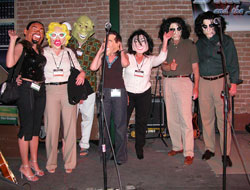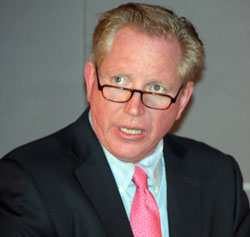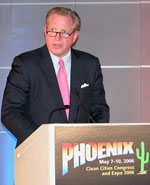 I know that Cindy already mentioned this but I’m getting ready to leave one alternative fuel event for another one. The Clean Cities Congress is over but tomorrow is “Ethanol Day” in Indianapolis. I’ll be attending all the events and collecting audio and pictures to share with you. The Ethanol Promotion and Information Council folks are working hard on getting the event organized. I look forward to seeing them there. There were several people here in Phoenix that said they’ll be there. Should be interesting.
I know that Cindy already mentioned this but I’m getting ready to leave one alternative fuel event for another one. The Clean Cities Congress is over but tomorrow is “Ethanol Day” in Indianapolis. I’ll be attending all the events and collecting audio and pictures to share with you. The Ethanol Promotion and Information Council folks are working hard on getting the event organized. I look forward to seeing them there. There were several people here in Phoenix that said they’ll be there. Should be interesting.
Concluding With Ecological Humor
 The Congress is over but posting won’t stop. Well, maybe for a while today.
The Congress is over but posting won’t stop. Well, maybe for a while today.
The office is being packed up around me and I think it’s time I do the same.
Our closing session featured ecological humor from Lori Weiss. She is a very funny person and she’s passionate about the environment.
To get to know more about her and hear a little bit of her humor listen to my interview:  Lori Weiss Interview (6 min MP3)
Lori Weiss Interview (6 min MP3)
Domestic Fuel coverage of the Clean Cities Congress is made possible by the following sponsors:


How to Win Over the Media
 The Alternative Fuels Media Training Workshop was a wonderful session to attend. During these three hours, Jenna Higgins as well as a couple guest speakers, talked about how to have a successful interview with the press.
The Alternative Fuels Media Training Workshop was a wonderful session to attend. During these three hours, Jenna Higgins as well as a couple guest speakers, talked about how to have a successful interview with the press.
Jenna gave some wonderful tips and advice about having a clear and concise interview with the media. Here are some of the key tips you should remember when you are doing an interview.
The Media is the best way to get your message out about alternative fuels.
Remember to relate your message to your audience, you have to make an impact on them. You should always be prepared before an interview. Make a couple notes to yourself on the questions you might need to answer and always have 3-4 strong sound bites. Communicate with your body not just words. But most importantly, relax and don’t forget to breathe! When completing an interview, remember to answer in complete sentences and relate it to your audience. Be enthusiastic and correct a reporter if a question is based on incorrect information.
I learned a lot in this wonderful media training workshop and hopefully after reading this, you did too.
Domestic Fuel coverage of the Clean Cities Congress is made possible by the following sponsors:


Next Year’s Congress Location
 The big announcement at Alice Cooper’s Town was next year’s Congress location. You can hear it in the announcement audio I have for you in this post.
The big announcement at Alice Cooper’s Town was next year’s Congress location. You can hear it in the announcement audio I have for you in this post.
It might be hard to tell from the picture but we had some masked characters from the city in question.
They all have something to do with “Tinseltown.”
Which means that next year we’ll be in Los Angeles.  Closing Reception Announcement (5 min MP3)
Closing Reception Announcement (5 min MP3)
Domestic Fuel coverage of the Clean Cities Congress is made possible by the following sponsors:


Energy Bill Roundtable
 Our energy bill discussion this morning covered a lot of ground.
Our energy bill discussion this morning covered a lot of ground.
Over the coming days I’ll try to bring you segments of it.
To get started here’s a selection which includes each participant answering the question of what he thinks is most important piece of legislation and why.
Here’s their response:  Energy Bill Roundtable (12 min MP3)
Energy Bill Roundtable (12 min MP3)
Domestic Fuel coverage of the Clean Cities Congress is made possible by the following sponsors:


Guest Speakers Speak about Alt. Fuels
 Senator John McCain, future presidential candidate, delivered a wonderful speech on the future of alternative fuels. The United States is deeply dependent on foriegn oil. The U.S alone uses about 7.6 billion barrels of oil a year. By using alternative fuels, you reduce the greenhouse emissions. An option proposed to help our environment and economy is to raise Corporate America Fuel Efficiency standards. There are currently 5 million flex fuel vehicles on the road but more are on the way. James D. Boyd talked about domestic fuels and its problems. California is the 5th largest economy and consumer of energy in the world. California is the second largest consumer of gas and diesel, the largest consumer is the United States. Many alternative fuel vehicles will be taking up the roads in California within the next year.
Senator John McCain, future presidential candidate, delivered a wonderful speech on the future of alternative fuels. The United States is deeply dependent on foriegn oil. The U.S alone uses about 7.6 billion barrels of oil a year. By using alternative fuels, you reduce the greenhouse emissions. An option proposed to help our environment and economy is to raise Corporate America Fuel Efficiency standards. There are currently 5 million flex fuel vehicles on the road but more are on the way. James D. Boyd talked about domestic fuels and its problems. California is the 5th largest economy and consumer of energy in the world. California is the second largest consumer of gas and diesel, the largest consumer is the United States. Many alternative fuel vehicles will be taking up the roads in California within the next year.
Domestic Fuel coverage of the Clean Cities Congress is made possible by the following sponsors:


Clean Energy CEO Remarks
 Our energy roundtable moderator this morning was Andrew Littlefair, CEO of Clean Energy.
Our energy roundtable moderator this morning was Andrew Littlefair, CEO of Clean Energy.
Before getting into the discussion he gave an overview of energy legislation.
You can hear his introduction here:  Andrew Littlefair Introductory Remarks (5 min MP3)
Andrew Littlefair Introductory Remarks (5 min MP3)
Domestic Fuel coverage of the Clean Cities Congress is made possible by the following sponsors:


Let’s Hear From The Executive Director
 The Executive Director of the Alternative Fuel Vehicle Institute is Annalloyd Thomason.
The Executive Director of the Alternative Fuel Vehicle Institute is Annalloyd Thomason.
We heard from her on stage earlier this week and to get to know her better and learn a little more about AFVI I sat down with her for a short interview.
Annalloyd explains how she and her husband Leo, started their own company and had the opportunity to take over the production of the Clean Cities Congress a couple of years ago.
You can listen to my interview with Annalloyd here:  Annalloyd Thomason Interview (6 min MP3)
Annalloyd Thomason Interview (6 min MP3)
Domestic Fuel coverage of the Clean Cities Congress is made possible by the following sponsors:


GM’s Reception Steals the Show
 Did you attend Sunday night’s opening reception? If you didn’t, then you missed out on a stomping good time! From admiring the beautiful artwork, to the energizing entertainment, many people went back to their hotels smiling. General Motors gave out $20,000 to the top three Clean Cities Reward recipients. The food was great, a big hit was the cute little cakes with the GM Logo on them. Overall, the GM reception was a wonderful night, and many people had a great time!
Did you attend Sunday night’s opening reception? If you didn’t, then you missed out on a stomping good time! From admiring the beautiful artwork, to the energizing entertainment, many people went back to their hotels smiling. General Motors gave out $20,000 to the top three Clean Cities Reward recipients. The food was great, a big hit was the cute little cakes with the GM Logo on them. Overall, the GM reception was a wonderful night, and many people had a great time!
Domestic Fuel coverage of the Clean Cities Congress is made possible by the following sponsors:


Energy Panel Is Discussing
 Our final day general session is going on right now.
Our final day general session is going on right now.
It’s being moderated by Andrew Littlefair, Clean Energy. Andrew has a challenge considering the panel has some very outspoken industry representatives but he’s handling it very well.
The panel consists of (l-r) Phil Lampert, NEVC, Scott Gerke, American Honda, Rich Kolodziej, NGVA, Joe Jobe, NBB and Brian Feehan, PERC.

I’m recording the complete session and will post a portion of it when complete. Then I think I’ll post pieces of it later as time permits.
While the session is going on the exhibit hall is still open. I’ve got some pics from it to post for you too.
Domestic Fuel coverage of the Clean Cities Congress is made possible by the following sponsors:



